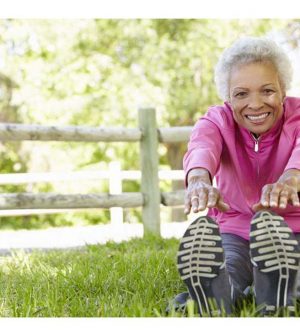- Double Mastectomy May Offer No Survival Benefit to Women With Breast Cancer
- Toxic Lead Found in Cinnamon Product, FDA Says
- Certain Abbott Blood Sugar Monitors May Give Incorrect Readings
- Athletes Can Expect High Ozone, Pollen Counts for Paris Olympics
- Fake Oxycontin Pills Widespread and Potentially Deadly: Report
- Shingles Vaccine Could Lower Dementia Risk
- Your Odds for Accidental Gun Death Rise Greatly in Certain States
- Kids From Poorer Families Less Likely to Survive Cancer
- Tough Workouts Won’t Trigger Cardiac Arrest in Folks With Long QT Syndrome
- At-Home Colon Cancer Test Can Save Lives
Timing of Menopause Could Affect a Woman’s Muscle Loss

Women who enter menopause early could be at increased risk of muscle loss in their senior years, a new study suggests.
Conversely, the more extended a woman’s reproductive period, the lower the risk of declining muscle mass as measured by handgrip strength.
“This study showed that a longer reproductive period and later age at menopause were linked to a lower risk of low handgrip strength in postmenopausal Korean women,” said Dr. Stephanie Faubion, medical director for The Menopause Society.
“This finding may relate to the beneficial effects of estrogen on skeletal muscle,” she added in a society news release.
It’s projected that by 2045 more than 70% of people over 65 will be affected by sarcopenia, a decline in muscle mass and function that occurs as part of the aging process, researchers said in background notes.
A woman’s reproductive lifespan — the time between the beginning and end of her periods — is known to affect the way she ages. However, no research has focused on the relationship between sarcopenia and the reproductive period, the researchers noted.
The new study evaluated more than 2,300 postmenopausal Korean women between the ages of 45 and 75, testing their handgrip strength – one of the most common ways to check for muscle loss.
Researchers found that the age at menopause was associated with reduced handgrip strength, but not the age at which menstruation began.
The findings were published Nov. 28 in the journal Menopause, a publication of The Menopause Society.
These results could vary for women of other races, the researchers noted, because Asian women tend to experience sarcopenia less often.
“Additional longitudinal studies are needed in different populations to confirm these findings,” Faubion said.
More information
The Cleveland Clinic has more about early menopause.
SOURCE: The Menopause Society, news release, Nov. 29, 2023
Source: HealthDay
Copyright © 2024 HealthDay. All rights reserved.










